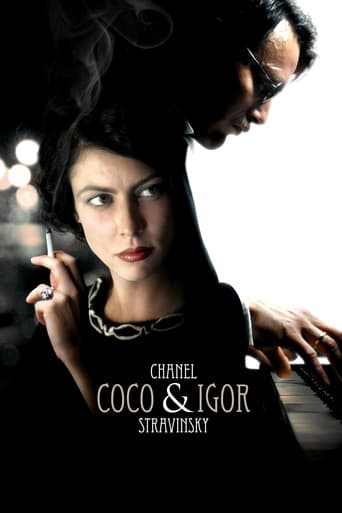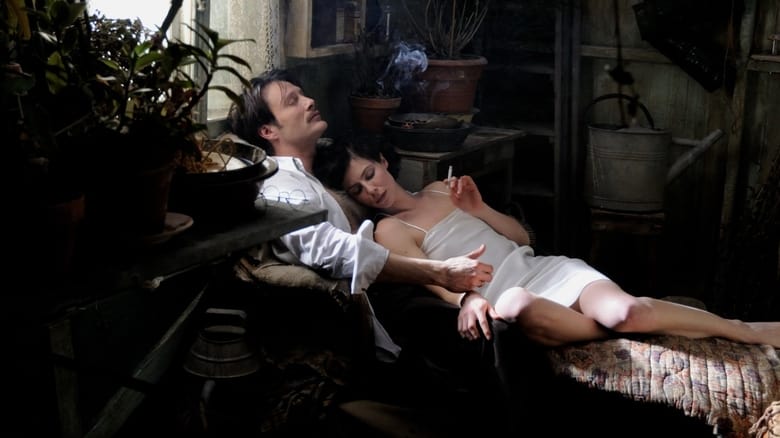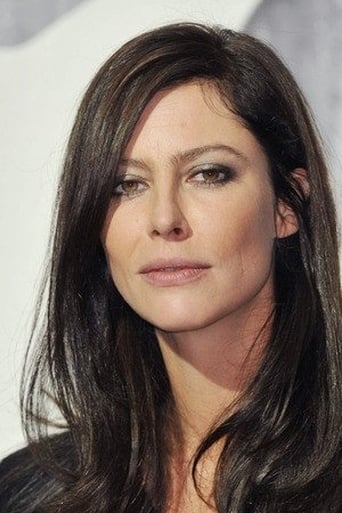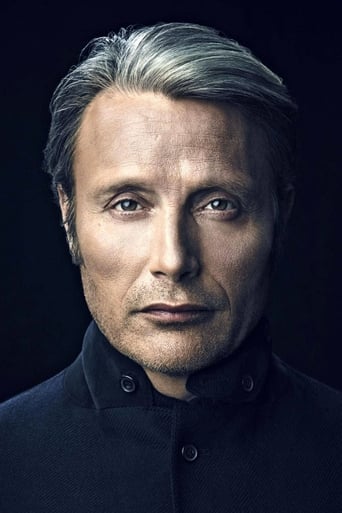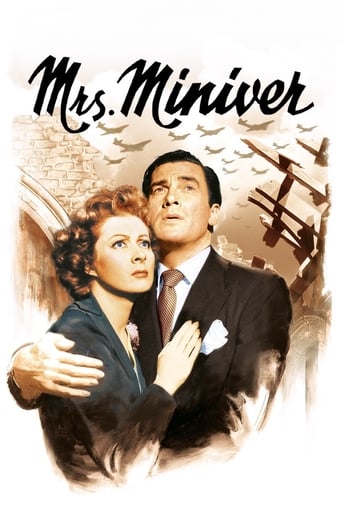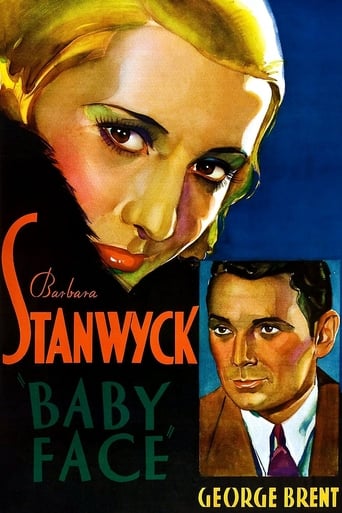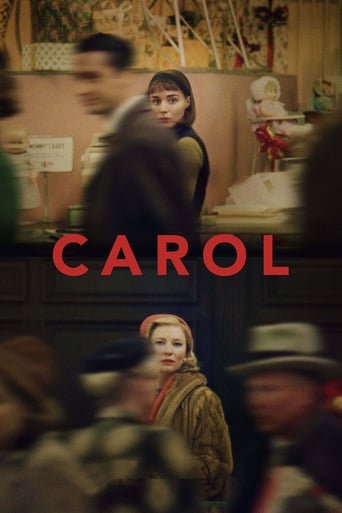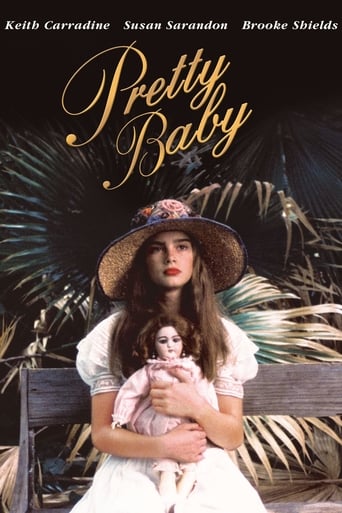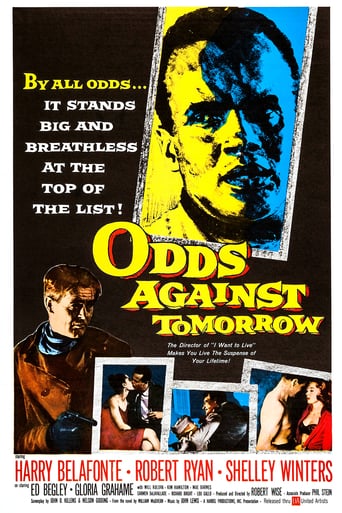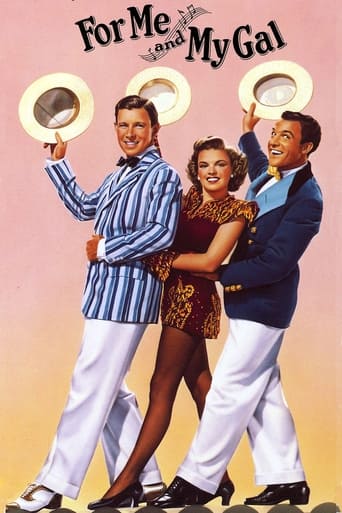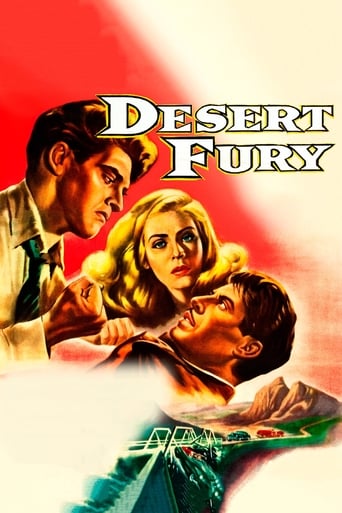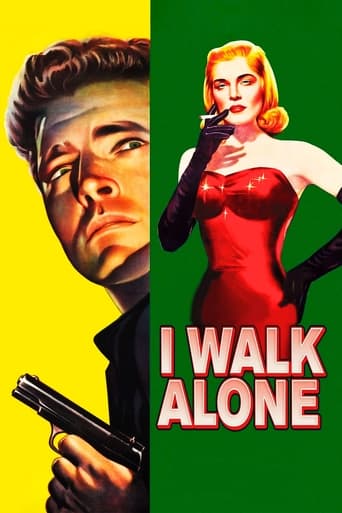Coco Chanel & Igor Stravinsky (2010)
Paris 1913. Coco Chanel is infatuated with the rich and handsome Boy Capel, but she is also compelled by her work. Igor Stravinsky's The Rite of Spring is about to be performed. The revolutionary dissonances of Igor's work parallel Coco's radical ideas. She wants to democratize women's fashion; he wants to redefine musical taste. Coco attends the scandalous first performance of The Rite in a chic white dress. The music and ballet are criticized as too modern, too foreign. Coco is moved but Igor is inconsolable.
Watch Trailer
Cast


Similar titles
Reviews
Yawn. Poorly Filmed Snooze Fest.
I wanted to but couldn't!
Absolutely Fantastic
While it doesn't offer any answers, it both thrills and makes you think.
Coco Chanel and Igor Stravinsky (2009)It begins with the shocking (at the time) premier of the 1913 Russian composer Igor Stravinsky's great ballet, "Rite of Spring," that resulted in a minor riot in the theater (police were called, people were out of their seats and shouting). In a way, this recreation justifies the film right there--it's a bold and believable staging of the original, which has huge importance in the history of music and dance.Then there is a party after the war, with typical early 1920s abandonment. A new era has arrived, and Stravinsky and Chanel meet.The rest might seem to be history, but it's not. The whole rest of the film is really fiction, overall, a supposed affair between the two, and the supposed results of it in their work (Chanel No. 5 and some of Stravinsky's middle period works). It's a slow unfolding, in part because there is little to work with. The first half hour is made up of just two scenes (the ballet and the party). Then there are mostly quiet and upscale domestic situations, some intimacies, some quiet times between. The period details are pretty wonderful, and the filming is respectfully beautiful, much like a Merchant Ivory film (which might be set in the same general period). Acting? This is a puzzle. Both Chanel (French actress Ann Mouglalis) and Stravinsky (Danish actor Mads Mikkelsen) play everything with painful restraint. Who's to say exactly what these people were like, but surely the music is nothing if not crazy for the times (and beautifully crazy, for sure), and the fashions were nothing if not radical (and beautifully so)? But things develop as if everyone is psychotically shy and inhibited.Most of you know there was another Coco Chanel movie released this same year, "Coco before Chanel," about the young woman's life before her fame, and in a way, the Coco there played by Audrey Tatou makes more sense. That movie was imperfect, too, and it might be said that between the two, a glimpse of the real woman might be possible, which is in a way remarkable enough. The addition of Stravinsky and his music is compelling on an artistic level, but not a dramatic one. The movie, in its own way, tries to be romantically dramatic. The camera moves around people as they speak, and follows them into rooms and around corners. The music (mostly Stravinsky's) is vivid and rich (and Modern), and the sets are filled with plain old prettiness--wallpaper and light through doorways and a room full of flower petals (leading, we find out, to perfumes). It's all a great place to end up for an evening.If only the company were more interested, and interesting.
I am not particularly acknowledged with either Coco Chanel's or Igor Stravinsky's lives and careers, and frankly, I never bothered to investigate them in detail. That is until I saw this excellent motion picture...What fascinated me from the first 'till the last frame was the whole way "Coco Chanel & Igor Stravinsky" was filmed. The frame is absolutely perfect, and it's not hard to realize that this movie was made by an educated professional who knows his camera well. Each scene, each cut and setting is right, and united together with an emotional story and very good acting this becomes film a lasting experience in the eye of the beholder. I honestly don't know whether the story is based on true facts or fiction, yet the script is written well enough to be truly convincing. Good job!Beside the technical brilliance, there's yet another thing which made me love this motion picture - The surrounding of the filming location was a jewel in a crown, maybe even the shiniest one. I particularly like the interior decoration of Art Deco, and "Coco Chanel & Igor Stravinsky" shows the finest example.In short - this film is a solid example of how movie making can still be treated as art, despite this modern cinematic world of one liners and CGI. 10 points well earned.
Anyone who presumed that this film would be a follow-on from 'Coco before Chanel', Anne Fontaine's endearing, rags-to-riches depiction of Gabrielle 'Coco' Chanel, would be mistaken. This film is director Jan Kounen's attempt to portray Coco how she really was: a mean-spirited, conceited femme fatale.Only the avant-garde artistry of Igor Stravinsky's music is enough to mollify Coco (Anna Mouglalis). The Russian composer's controversial work repels most for being too audacious and violent, but it entrances her, and after the Russian revolution leaves Igor and his family penniless, Coco invites them to live with her. Igor accepts and thus begins a cataclysmic affair.What begins as a 'Remains of the Day'-type attraction – where Anthony Hopkins and Emma Thompson were at pains to disclose their true feelings for each other and could only do so through knowing glances – very quickly descends into a sex-crazed love affair rivalling the one in 'Last Tango in Paris'.A subject you can usually trust French filmmakers with, however, what's missing from the plentiful love scenes between the two is, frankly, love. In fact, their entire relationship is rather curious. It's redolent of the relationship a drug addict has with drugs: It's the feeling the substance gives that's sacrosanct, not the substance itself.I was unmoved by what I believed should have been an intense performance for the part of Igor (Mads Mikkelsen). It is staid and lacklustre, interrupted by the occasional paroxysm when he is writing or playing music. The filming of Stravinsky's seminal piece, 'The Rite of Spring' in the grand Champs-Élysées theatre (as in actuality) is very impressive: the suspense, drama and sheer creepiness convince you that you are seeing the spectacle for real.It may be reasonably assumed that Coco was purely a product of her insular background - provincial, orphaned, raised by nuns - but she is never worthy of pity. The only person who deserves this is Igor's wife, Katherine (Yelena Morozova). Her characterisation of a powerless woman who sees her husband slip away from her inch by inch is so full of pathos that it leaves you contemplating whether to buy a bottle of Chanel No. 5 ever again.For all her brutality, though, there's a wonderfully dainty scene where she formulates her signature fragrance. As with everything else, she's very pernickety and it's only after playing Goldilocks that she arrives at the correct blend of the 80 ingredients.Asked if she ever felt guilty for her deeds, Coco simply says 'No' unbearably cavalierly, which left me wondering: If she never had any humanity for herself, why should we have any for her?www.scottishreview.net
Anna Mouglalis is very thin, Mads Mikkelsen has wonderful cheekbones and they do not convince me that they are playing Coco Chanel and Igor Stravinsky respectively. The other actors, with the exception of Grigori Manukov as Diaghilev, left no impression on me at all. Surely Chanel had more passion, more anger in her than we see in Mouglalis; surely Stravinsky made more attempts to assert himself with the domineering Chanel than Mikkelsen does here.I was left with a great regret that the great masters of cinema have gone, the directors that were able to fashion material like this into art: Visconti, Losey, Ophuls.

